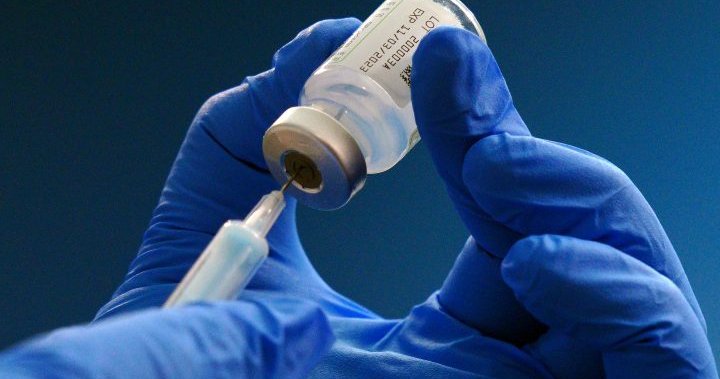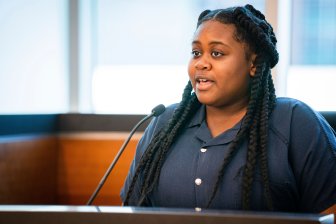When can you get an Omicron booster? Here’s how provinces are rolling them out | Globalnews.ca
In preparation for an expected fall COVID-19 wave, Canada has started rolling out updated vaccines to target the Omicron variant.
Earlier this month, Health Canada approved Moderna’s bivalent vaccine, which includes the original COVID-19 strain and BA.1 subvariant of the Omicron lineage, to be given as a booster dose to all Canadian adults.
Read more:
Bivalent COVID vaccines in Canada: How do they work and who can get them?
Read More
-
Bivalent COVID vaccines in Canada: How do they work and who can get them?
Canada received 780,000 doses of Moderna’s Omicron booster on Sept. 2, with a total of 10.5 million to be delivered by the end of the month, according to Health Minister Jean-Yves Duclos.
The National Advisory Committee on Immunization (NACI) recommends that the bivalent Omicron vaccine be given as a booster dose to people aged 18 and older at least six months after their last dose or COVID-19 infection.
People who are at a high risk of illness may be offered the bivalent shots at a shorter time interval of at least three months, NACI says. Adolescents aged 12-17 who are immunocompromised or otherwise at risk of severe infection are also advised to get the Omicron boosters.

Here’s a look at how different provinces are rolling out the new vaccines and who can get them.
In Ontario, residents who are considered the most vulnerable are being prioritized for the bivalent boosters.
On Monday, the province opened up appointments through its online booking system those aged 70 and older, long-term care residents, Indigenous people, pregnant individuals, those who are immunocompromised and health-care workers.
Starting Sept. 26, all Ontarians aged 18 and above will become eligible for the shots.
All booster appointments will be paused until Sept. 26 for people outside the priority populations to accommodate distribution, the provincial government announced on its website.

In Quebec, Moderna’s bivalent doses were made available last week, but this vaccine is only recommended for those who are 30 or older.
Those who are under 30 are advised to stick with Pfizer’s original COVID-19 vaccine, as Quebec’s vaccine committee says Moderna’s shot presents a higher risk of myocarditis (inflammation of the heart muscle) in the under-30 age group.
Those under 30 will, however, be eligible to get the Moderna shot if they prefer, and will be able to choose between the older or newer generation of vaccine.

British Columbia has yet to start offering bivalent vaccines.
British Columbians will receive a notice through the Get Vaccinated system when they are eligible to book an appointment.
Read more:
B.C. launches fall booster campaign with next COVID surge expected in November
The timing of invitations will be based on risk and age, as long as it has been six months since the previous dose, the province said last week.

Priority groups will include people over the age of 60, Indigenous people, those who are vulnerable, and health-care workers.
According to a draft plan by the B.C. Centre for Disease Control (BCCD), more than 1.2 million doses of Moderna’s bivalent variance are set to arrive this month.
Approximately 517 pharmacies will be the first to receive the vaccine and health authority clinics will start Sept. 19.
In Alberta, bookings for and administration of doses begins on Sept. 21.
Albertans aged 18 and older who have completed a primary series of COVID-19 vaccination are eligible, but must wait at least five months between doses.
“A shortened interval of three months can be considered” for individuals at higher risk of severe outcomes, a press release from the province read on Wednesday.

The province also noted that a bivalent COVID-19 vaccine for Albertans aged 12-17 is expected in late September or early October.
And starting the week of Oct. 3, the bivalent booster will be offered with the influenza vaccine to residents in senior congregate care facilities.
Nova Scotia will begin its fall COVID-19 vaccine rollout on Monday.
People aged 65 or older can book now appointments, the province announced Thursday.
Read more:
Omicron-adapted COVID-19 vaccines: Could updated shots prevent a fall wave?
“Public Health recommends that Nova Scotians 18 and older who are eligible for their fall dose receive a dose of bivalent vaccine rather than the original vaccine,” the Health and Wellness department said in a statement.
It is recommended that the booster be given 168 days after the primary series was completed for most people in Nova Scotia.
Those who are moderately to severely immunocompromised and people aged 70 years and older are eligible for a shortened interval of 120 days from their last vaccine, the province says.

On Wednesday, Manitoba kicked off its bivalent vaccination appointments.
The doses are being offered to seniors aged 65 and above, Indigenous people, those with higher-risk medical conditions, pregnant individuals, health-care workers and residents of personal care homes and other congregate living facilities.

Eligibility will be expanded to all Manitobans aged 18 and older in the coming weeks based on supply and initial uptake, the province said on its website.
As of this week, a total of 105,250 doses were expected to be delivered in the first two shipments.
“It is recommended that all adults wait for access to a bivalent vaccine, as it provides additional protection from Omicron variants of COVID-19,” the government said.
Saskatchewan has also begun offering the Omicron-targeting boosters to its highest risk population, at least four months following their last COVID-19 vaccination.
Currently, adult residents of long –term care, personal care homes and other congregate living facilities are eligible for Moderna’s bivalent vaccine in Saskatchewan.
The Saskatchewan Health Authority (SHA) said these facilities will be contacted over the next few weeks to arrange appointments.

Starting Sept. 19, the province will open up the vaccines to all Saskatchewan residents aged 70 years and older and Indigenous people aged 50 and above.
As of this week, Saskatchewan will have received approximately 90,000 doses from the federal government in the first two deliveries to the province, with more expected to follow later in September.
The vaccines will be made available to the wider population as more doses become available, the province said, with a program expansion announcement anticipated in early October.
Newfoundland and Labrador
Newfoundland and Labrador will begin its rollout on Sept. 21.
At this time, those who are eligible to book an appointment through pharmacies and physicians include people aged 65 and older, residents of long-term care homes or congregate living facilities for seniors, and individuals 12 years of age or older with an underlying medical condition.
Read more:
Health Canada approves Moderna’s Omicron COVID booster; 780K doses arriving Friday
Indigenous and racialized communities as well as adult residents of shelters, group homes and correctional facilities are also being prioritized for the bivalent shots, N.L. Chief Medical Officer of Health Dr. Janice Fitzgerald said during a news conference Wednesday.
The province will receive initial shipments of approximately 63,000 doses this month, with more to follow, she told reporters.
“We have asked that pharmacies and physicians help to preserve the initial supply of bivalent vaccine by ensuring that they have a vaccine clinic fully booked prior to ordering (their vaccine supply),” Fitzgerald said.

Prince Edward Island has received 13,000 doses of Moderna’s bivalent vaccine, which is being distributed to vaccine clinics and community pharmacies on request.
Anyone aged 18 and above is eligible to get this booster “as long as it has been six months since their previous dose,” Dr. Heather Mirrison, P.E.I.’s chief public health officer said.
“Although it is recommended to wait six months, individuals can choose to receive their booster dose as early as three months after their last dose of vaccine,” the Department of Health and Wellness states on its website.
Starting this week, priority groups will be able to make appointments in New Brunswick.
As of now, those who are eligible for the bivalent doses include residents aged 50 and older, immunocompromised adolescents aged 12-17 or those who have high-risk medical condition as well as adults who live in a First Nations community.
Starting in October, long-term care residents will be offered a bivalent booster, along with their influenza vaccine, the health ministry announced Wednesday.
In Nunavut, Moderna’s updated vaccines will be given as a booster dose at least three months after the completion of the primary series.
So far, the territory has been allotted 4,000 doses, with an initial supply of 2,650 received and the remaining expected to arrive next week.
Due to a limited supply, these vaccines are being offered to elderly people aged 70 years and older and all residents and staff in long-term care facilities.
“The Government of Nunavut will publicly communicate new eligibility criteria as supplies arrive in territory,” said Chris Puglia, a spokesperson for the Nunavut’s Department of Health.
An announcement on expanded eligibility is expected next week, he said.

Yukon and Northwest Territories have not yet made their rollout plans public. The territories did not respond to a request from Global News by the time of publication.
© 2022 Global News, a division of Corus Entertainment Inc.
For all the latest health News Click Here





